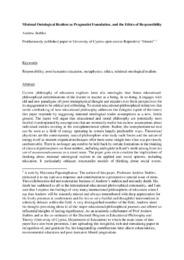| dc.contributor.author | Stables, Andrew | en |
| dc.creator | Stables, Andrew | en |
| dc.date.accessioned | 2022-03-10T14:24:45Z | |
| dc.date.available | 2022-03-10T14:24:45Z | |
| dc.date.issued | 2021-12-21 | |
| dc.identifier.uri | http://gnosis.library.ucy.ac.cy/handle/7/65106 | |
| dc.description.abstract | Current philosophy of education explores inter alia ontologies that frame educational-philosophical determinations of the learner or teacher as a being. In so doing, it engages with old and new paradigms of (post-)metaphysical thought and requires ever fresh perspectives for its engagement to be critical and refreshing. To recent educational-philosophical initiatives that invite a rethinking of how educational philosophy addresses the Zeitgeist (spirit of the times) this paper responds by suggesting minimal ontological realist assumptions as a new, fertile ground. The paper will argue that educational and moral philosophy are potentially most fruitful if underpinned by assumptions that are minimally realist but eschew assumptions about individual entities existing in the extraphenomenal sphere. Rather, the extraphenomenal real can be seen as a field of energy operating in certain largely predictable ways. Theoretical physicists are the contemporary natural philosophers who study such forces and the nature of energy itself as modern empirical techniques offer them some insight into what was previously unobservable. There is no longer any need to be held back by certain limitations in the thinking of classical philosophers on these matters, including ambiguity in Kant’s work arising from his use of noumenon/noumena as a count noun. The paper goes on to consider the implications of thinking about minimal ontological realism in the applied and social spheres, including education. It particularly critiques structuralist models of thinking about social events, especially those that emphasise the importance of hidden, deep structures that drive surface events. | en |
| dc.language.iso | eng | en |
| dc.rights | CC0 1.0 Universal | * |
| dc.rights | info:eu-repo/semantics/openAccess | en |
| dc.rights | Open Access | en |
| dc.rights.uri | http://creativecommons.org/publicdomain/zero/1.0/ | * |
| dc.subject | Responsibility | en |
| dc.subject | Post-humanist education | en |
| dc.subject | Metaphysics | en |
| dc.subject | Ethics | en |
| dc.subject | Minimal ontological realism | en |
| dc.title | Minimal Ontological Realism as Pragmatist Foundation, and the Ethics of Responsibility | en |
| dc.type | info:eu-repo/semantics/article | en |
| dc.type.uhtype | Article | en |
| dc.description.notes | The author of this paper, Professor Andrew Stables, entrusted it to my care as a response and contribution to a prospective special issue of mine. This collaboration did not materialize because of Andrew’s sudden and untimely death. His death has saddened us all in the international educational-philosophical community, and I am sure that I express the feelings of very many international philosophers of education when I say that Andrew will be sincerely missed and always remembered with deep appreciation for his lively presence at conferences and for his so very fruitful and thoughtful interventions in scholarly debates within the field. A very distinguished member of the field, Andrew aired his thought-provoking ideas in all the major educational-philosophical journals and offered us influential insights of lasting significance. As an academic collaborator of Prof Andrew Stables and as the co-ordinator of the Doctoral Program in Educational Philosophy and Theory (University of Cyprus, Department of Education) to which the main ideas of this paper have also been presented, I am uploading this insightful, rich and stimulating paper in recognition of, and gratitude for, his longstanding contributions inter alia to edusemiotics, environmental education and post-humanist liberal pragmatism. | en |
| dc.contributor.orcid | Stables, Andrew [0000-0002-6755-1806] | en |
| dc.type.subtype | OWN_PUBLICATION_NO_EDITORSHIP | en |


